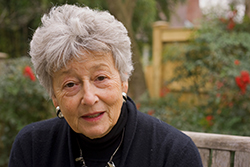God Is Beside the Point

Parenting expert Ruth Nemzoff loves how Judaism makes room for disagreement on so many topics, including the belief in God.
by Dr. Ruth Nemzoff
Dr. Ruth Nemzoff is no stranger to grappling with large, complicated topics. After all, she is the author of Don’t Roll Your Eyes: Making In-Laws into Family (Palgrave/Macmillan, 2012) and Don’t Bite Your Tongue: How to Foster Rewarding Relationships with Your Adult Children (Palgrave/Macmillan, 2008). She is also a resident scholar at the Women’s Studies Research Center at Brandeis University and holds a doctorate in social policy from Harvard University, an MA in counseling from Columbia University, and a BA from Barnard College. Following are Ruth’s viewpoints on Jewish atheism and whether it even matters.
In what ways, if any, have you struggled with being Jewish and not believing in God?
As a preteen, I struggled with this concept until I decided it doesn’t matter whether there is a God or not. One must be a good person on Earth.
Have your thoughts about God changed over the years, or would you say that you never believed strongly in a God?
My thoughts have not changed since then.
Is this a topic (being Jewish and not believing) you’ve opened up to other people about and, if so, what has been the response?
I find many Jews feel the same way or are even more certain that there is no God.
When you heard about the 2013 Pew study, which reported that two-thirds of Jews polled said it is “not necessary to believe in God to be Jewish,” how did that make you feel?
Not surprised, as I have encountered many Jews who feel this way.
You have said that you are not a believer in God, and that you’ve gotten to a place where it does not matter to you. Can you explain how you have made peace with this?
I made peace by believing that whether there is a God or not, we must try to be good people and try to make the world a better place. When I read Pascal, who grappled with the question of whether or not there is a God, and felt that it is necessary to bet and to be safe, he would bet there was one. I disagreed. I feel we don’t need to know.
Does the fact that you are “not a believer” deter you from going to synagogue and/or saying prayers, where there is so much patriarchal language around God? Why or why not?
No, I feel comfortable in a synagogue. I like the tradition. The patriarchal language does bother me as a feminist. Fortunately my synagogue at least makes an attempt to use male and female images of God and includes the matriarchs.
I have also learned to “translate in my head” the meanings of the prayers. For example, take the Shema prayer, with the words: “Hear o’ Israel the Lord our God is One.” In my mind, this does not mean there is a Lord overseeing the universe, but rather that there are forces in nature and fate which I am humbled by, over which I have no control. The oneness to me is the enormity and unity of all. It reminds me of my impotence in the great scheme of things. To me, the translation is more of an interpretation.
What would you say to those who feel that you can’t be Jewish and atheist, that Judaism and God cannot be separated?
I would say they have a right to their beliefs, and I have a right to mine. There are many subjects and details upon which Jews disagree. In fact, one of the things I love about Judaism is that two people can disagree. Witness a page of Talmud and, of course, Shamai and Hillel are but one example.
You are a parenting expert who lectures and writes about having healthy relationships with one’s children. How do you think Jewish parents, who are atheists, talk to their children about this topic, particularly when young children ask about God?
I think parents should explain their own beliefs, but also talk about what other people believe in a non-judgmental way.
About the Author
 Dr. Ruth Nemzoff is no stranger to grappling with large, complicated topics. After all, she is the author of Don’t Roll Your Eyes: Making In-Laws into Family (Palgrave/Macmillan, 2012) and Don’t Bite Your Tongue: How to Foster Rewarding Relationships with Your Adult Children (Palgrave/Macmillan, 2008). She is also a resident scholar at the Women’s Studies Research Center at Brandeis University and holds a doctorate in social policy from Harvard University, an MA in counseling from Columbia University, and a BA from Barnard College. Following are Ruth’s viewpoints on Jewish atheism and whether it even matters.
Dr. Ruth Nemzoff is no stranger to grappling with large, complicated topics. After all, she is the author of Don’t Roll Your Eyes: Making In-Laws into Family (Palgrave/Macmillan, 2012) and Don’t Bite Your Tongue: How to Foster Rewarding Relationships with Your Adult Children (Palgrave/Macmillan, 2008). She is also a resident scholar at the Women’s Studies Research Center at Brandeis University and holds a doctorate in social policy from Harvard University, an MA in counseling from Columbia University, and a BA from Barnard College. Following are Ruth’s viewpoints on Jewish atheism and whether it even matters.
To learn more about Ruth Nemzoff, visit www.dontbiteyourtongue.com.
There are no comments yet, add one below.




Leave a Comment